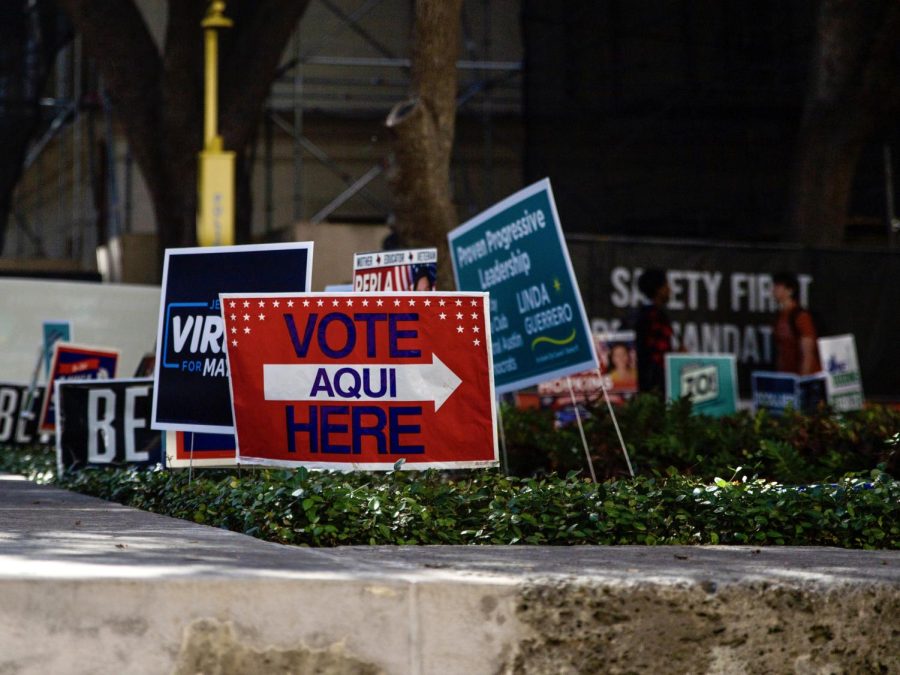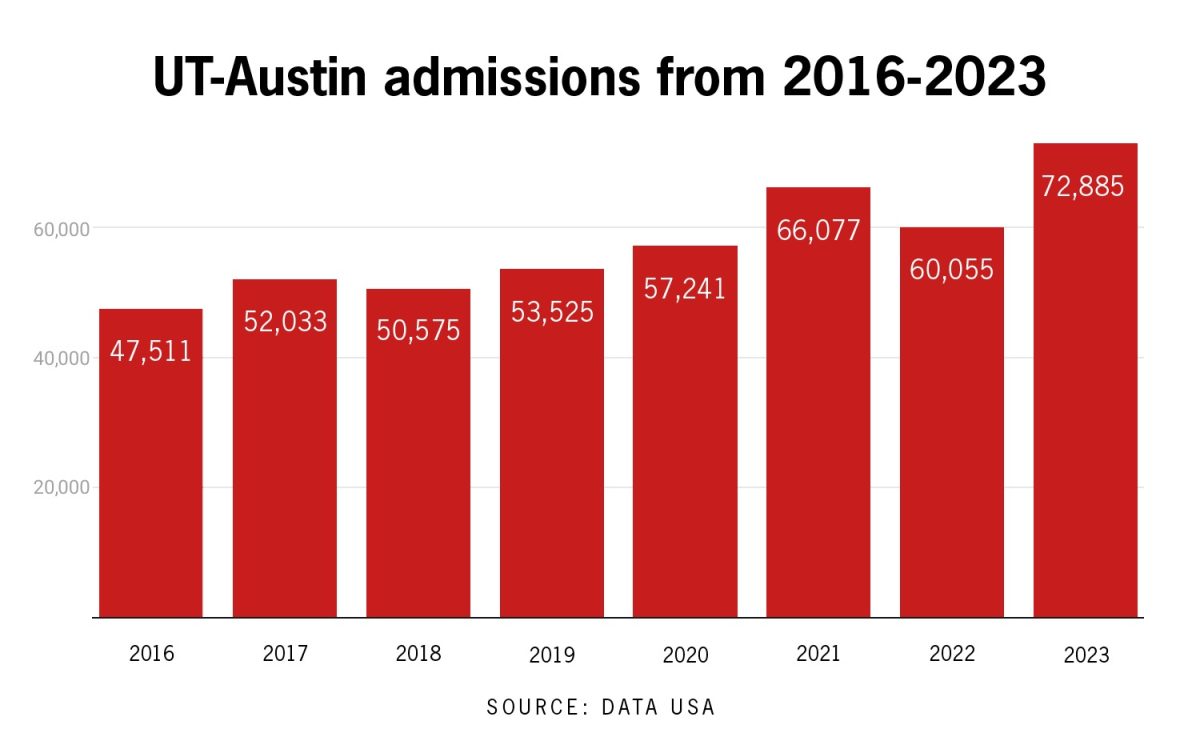On Jan. 5, 2021, Elizabeth Gonzales faced every mother’s worst fear. Austin Police shot and killed her son, Alex Gonzales Jr., who was 27 years old.
According to an Austin Police report, the incident began when off-duty officer Gabriel Gutierrez witnessed Gonzales Jr. exhibit erratic driving in southeast Austin. Gutierrez said he saw Gonzalez point a gun at him. Gutierrez responded and shot at Gonzales Jr. eight times before calling for backup.
After arriving at the scene, officer Luis Serrato ordered Gonzales Jr., who had been shot in the head, not to move or reach into the car. According to the Office of Police Oversight report, when Gonzales Jr. opened the back door, likely to check the safety of his infant child, Serrato shot him 10 times, killing him. Gonzales Jr. never fired a gun.
Elizabeth Gonzales said the city did not communicate with her throughout the internal investigation into Gutierrez and Serrato. In a Public Safety Commission meeting on Oct. 2, Gonzales said it took nearly 24 hours for police to inform her of her son’s death and 140 days to see the bodycam footage of the shooting.
Gonzales said she knew little about the police system until the murder of her son, after which she began advocating for the Austin Police Oversight Act.
“I never thought I would be an advocate until they murdered my son,” Gonzales said. “(The police) took something so precious from me that I’ll never get back, and I miss my son more than anything in this world. He was my partner, my friend, my everything.”
During the summer of 2022, non-profit Equity Action began petitioning for the Austin Police Oversight Act, a local ordinance to strengthen the Office of Police Oversight and increase transparency within the police department. In response, the police union funded a group called Voters for Oversight and Police Accountability and began petitioning for a nearly identical ordinance that would have considerably weakened the Office of Police Oversight. The ordinance would have removed the anonymous complaint system as well as the requirement to conduct preliminary investigations of complaints.
Both ordinances appeared on last May’s ballot, with the Equity Action petition represented as Proposition A and the Voters for Oversight and Police Accountability petition represented as Proposition B. Despite the confusion, Austin voters approved Prop A at approximately 80% to 20% and voted against Proposition B by the same margin.
Though voters approved the ordinance in May, the city has made little progress in following through with implementation. In September, city councilmembers Zohaib “Zo” Qadri, Ryan Alter, Vanessa Fuentes and José ”Chito” Vela introduced a resolution to direct Jesus Garza, the interim city manager, to implement all legally allowable aspects of Prop A.
Without proper training, Office of Police Oversight staff have limited access to police data and body camera footage. The resolution required the city manager to enroll the Office of Police Oversight staff in Criminal Justice Information Services training.
The resolution instructed the city manager to enroll staff in CJIS training by Oct. 1. Sara Peralta, the Office of Police Oversight spokesperson, said all 12 employees have completed or are in the process of training.
“OPO has been working diligently to put any additional procedures in place to align with the provisions outlined in this resolution,” Peralta wrote in an email. “We are also in the process of recruiting staff for OPO’s complaints division to ensure that we have the necessary resources to meet our obligations.”
Chris Harris, the director of policy at the Austin Justice Coalition, said the resolution was necessary to ensure Prop A is not forgotten by the city.
“The reason that it was necessary, unfortunately, is that the city manager thus far has neglected to implement Prop A, despite the fact that it passed over four months ago with 80% of the vote,” Harris said.
One reason Gonzales advocated for the Police Oversight Act was the provision requiring the police chief to respond publicly to recommendations of both the Office of Police Oversight and the city’s citizen review board. When two police officers shot and killed Alex Gonzales Jr., the office recommended firing Gutierrez, and the review board recommended firing both officers. Joseph Chacon, Austin’s police chief at the time, ignored the recommendation and reinstated both officers to their full-time positions.
“They shouldn’t have a job once they murder somebody, or go back to policing, or own a gun either,” Gonzales said.
Harris said the lack of training did not make sense considering the minimal cost and time required to complete the training. According to the Department of Public Safety website, the online training consists of a few modules and an hour-long test.
City officials have also fought the provision of Prop A that directed the city to stop maintaining G-files, private records of police misconduct and discipline. On Sept. 17, the Texas Attorney General ordered the City of Austin to release officer Christopher Taylor’s file to the Austin Chronicle but later reversed the decision.
“In the Attorney General’s second opinion, what they made clear is that if the city continues to maintain G-files, then those files should remain secret,” Harris said. “But what they made clear is that maintenance of a G-file is discretionary.”
According to state law, cities may maintain G-files but are not required to.
“Given that the proposition says that the city shall not maintain a G-file, it’s pretty clear that they shouldn’t be doing it,” Harris said.
Harris said the legal issues that the city and police have mentioned are excuses to delay implementation.
“The city legal department gave the green light to this resolution,” Harris said. “Which really indicates that there are not legal issues with at least these parts of Prop A, and it should have been implemented long ago.”
Other aspects of Prop A cannot be implemented without a police contract. As of now, the City of Austin and the police association have no contract. When the union’s four-year contract expired in December 2022, Austin City Council offered a one-year contract instead of the usual four-year contract so Prop A could be incorporated into the next contract. Citizen-initiated ordinances are only fixed for two years, so a four-year contract would overrule the result of the election.
The police association rejected the contract before Prop A was voted on, and it’s unclear when they will return to the negotiation table. Until then, many aspects of the ordinance cannot be enacted.
In a statement on X, previously known as Twitter, the police association wrote that they would not negotiate under the ordinance.
“We will not be forced back to the table under a structure in which a new city ordinance attempts to unlawfully interfere with the statutory rights associated with the meet and confer process,” the account posted.
State law says, in most cases, officers cannot be disciplined for misconduct six months after the incident. A provision in Prop A seeks to change that, but doing so requires a contract.
“Oftentimes police or oversight agencies aren’t made aware of incidents for well after the day that occurred,” Harris said. “It’s also very easy to help an officer avoid accountability by simply slow rolling an investigation, making sure it takes longer than it might otherwise take so that if you don’t complete an investigation until after 180 days, the police chief’s hands are tied.”
For Elizabeth Gonzales, the fight is not over. Gonzales is currently suing the City of Austin for $18 million — one million for every bullet fired.
“That was 18 bullets they put through my son,” Gonzales said. “That was uncalled for. Five or six, I could understand, but 18? No. They’re going to pay me for that.”
Gonzales said if she wins the lawsuit, she plans to reinvest in her community to help other families like her.
“I died that day,” Gonzales said. “When you get one of your children, that came out of you, (killed) — you’ll never be the same. Never be the same.”




















